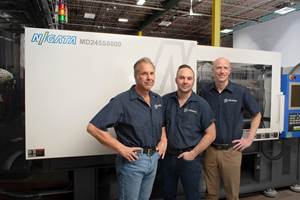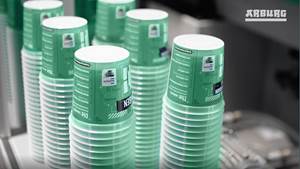Taiwan’s ‘Time is Coming’ For All-Electric Machines
Close Up on Technology
Taiwan’s plastics machinery market is a player on the global stage, except for one segment—all-electric machines. The recent Taipei Plas show suggests that’s about to change.
Taiwan’s 400-plus plastics and rubber machinery companies generated $1.2 billion in sales in 2013, with the sector ranked fifth globally behind only Germany, Japan, Italy, and China, according to TAMI , the country’s machinery association.
Walking the aisles at the island nation’s biennial plastics show, Taipei Plas, in September, visitors would have been hard pressed to find the all-electric machines that have come to dominate other global plastics events. That relative dearth of servo-driven machinery could change in coming years, as the Taiwanese government takes an active role in developing a domestic supply chain for key components, including ballscrews, linear guides, and servo motors and drives.
Alan Wang, vice chairman of TAMI’s plastics and rubber machinery committee, who also works for injection machine builder Fu Chun Shin (FCS) Group, acknowledged the current gap in his country’s equipment offerings: “For all-electric machines, Taiwanese machine makers face a bottleneck, especially for key components.” Wang said FCS participated in a government project, collaborating with a servomotor vendor to develop a drive specifically for use in all-electric molding machines. For the time being, however, Taiwan is highlighting hybrid machines.
“Right now, we’re in a transition period, developing hybrid products,” Wang explains. “We hope to narrow the gap between all electric and hydraulic.”
David Wu, who is employed by vertical press specialist Multiplas Enginery Co. Ltd. and serves as chairman of TAMI’s plastics and rubber machinery committee, noted that many Taiwanese machine makers were early adopters of all-electric technologies, but were forced to drop the machines when high-cost imported components squeezed margins.
“There are many Taiwanese companies that had all-electric machines but stopped manufacturing them because of the low margins,” notes Wu. “Taiwan is now ready to provide ball screws and servomotors. There are companies making them, but they are smaller power units, not for big machines. Once we develop a local supply, it will bring us more competitiveness in producing all-electric machines.”
GIVING ALL-ELECTRICS ANOTHER SHOT
Jon Wai Machinery Works Co. Ltd., prides itself on being at the forefront of plastics technologies, claiming many local firsts for the Taiwanese plastics equipment industry, and it is looking at re-entering the all-electric injection machine game. Jon Wai’s Harrison Chen notes that his company rolled out its first all-electric unit in 2000, outfitting it with Japanese ballscrews and servomotors that ultimately made the machine too expensive. With that experience in hand, the company will take another shot at an all-electric press, according to Chen, who called the technology a “must have” for an equipment supplier.
As its name suggests, Tung-Yu Hydraulic Machinery Co. Ltd.’s main products are hydraulic presses (for molding rubber), but at the show, the company launched an all-electric machine. Steven Yen, vice general manager, says the new machine will offer 80% lower energy usage than its hydraulic counterparts.
Fong Kee International Machinery Co. Ltd., which manufactures blow molding and extrusion equipment, launched a hydraulically powered bottom-blow molding machine at Taipei Plas, but Charles T.J. Wei, v.p. and CEO, said the company would transition to an all-electric model.
FKI was also an early all-electric adopter, launching a servo-powered blow molding machine in 2008, but it too found the component costs and overall machine price tag were too high for the market. Wei noted that in the intervening years, servomotor and ballscrew prices have dropped, creating a new opportunity. Wei estimated that all-electric machines formerly cost 70-80% more than hydraulic counterparts, but that gap has shrunk to around 40%.
“The time is coming for all-electric machines,” Wei said. “Before, buyers wouldn’t invest, but now they are looking.” In the summer of 2015, Wei said FKI would work on an all-electric two-station blow molding machine with multiple heads, targeting applications like shampoo bottles, with the goal of helping processors cut energy usage by around 60%. “Maybe in one year the processor can say, ‘I will get my return on investment,’ which makes the sale easier,” Wei says, noting that ultimate savings depend on the part being molded.
In its first all-electric venture, FKI teamed with a European supplier of key components, but this time around it’s hoping to source them domestically. “It’s our country’s brand,” Wei says. “The product must have good cost and the same performance; if so, we will use it.”
FCS Group, which marked its 40th anniversary in 2014, will also re-enter the all-electric injection molding market (U.S. representative is Maruka USA, Pine Brook, N.J.). The company’s first foray there was in 2005; but because it was forced to source key components from Japan, the machine’s pricetag proved too high for FCS’s customers and the effort was temporarily abandoned, according to John Hsieh, area manager, and David Chen, executive director. This time around, FCS is working in conjunction with the Taiwanese government to find local sources for key components like ballscrews and servomotors, and plans to release a new all-electric machine line next May or June.
Despite the partnership with the Taiwanese government and efforts to create a domestic supply chain, Hsieh acknowledged that for now it will be impossible to build a 100% Taiwanese-sourced all-electric press. He said the planned all-electric line will range eventually from 30 to 350 tons, but at first FCS will build the popular 150- and 200-ton models. It will utilize direct drive rather than belts.
Injection machine maker Chen Hsong was among the earliest adopters of all-electric press technology, launching a servo-driven press in 1994-1995, according to area sales manager Kevin Huang, with a development cost of $1 million. Starting in 1996, the company shifted its focus to hybrid machines, launching the first of these at Taipei Plas that year. Today, Huang said that around 90% of the nearly 15,000 machines Chen Hsong makes annually are hybrids. As patents expire, Huang believes servo-drive costs will move lower, but for now, Chen Hsong will remain focused on hybrids. In the U.S., Chen Hsong is represented by Gluco Inc., Jenison, Mich.
Victor Taichung, whose injection machines go by the Fortune brand in North America, entered the all-electric market 10 years ago, but unlike its fellow Taiwanese equipment suppliers, it has remained in the game. The company displayed two all-electric machines at Taipei Plas, 200- and 150-ton models from the second generation of the line.
Martin Li, manager of the company, notes that Fortune now supplies all-electric machines ranging from 50 to 300 tons. While he admitted that the market has moved up and down over the years, about 10% of Fortune’s current machine sales are derived from all-electrics. At present, Fortune outsources key components abroad, including drives from Rexroth, but it too hopes to source locally in the future, according to Li.
Related Content
Custom Injection Molder Plugs into All Electric Machines
Formerly a showroom for early-aughts-era Van Dorn hydraulics, the newest additions to Drummond Industries’ transforming fleet are all-electric Niigata injection molding machines.
Read MoreU.S. Debut for Slimmed Down Electric Machine
NPE2024: Arburg’s debut of the 310-ton Allrounder 720 E Golden Electric extends the tonnage range of the electric series and marks the first global press premiere outside of Germany.
Read MoreAll-Electric Injection Molding Machine Line Expands
Fakuma 2024: Engel unveils new e-mac 500 with “High” clamping drive and encapsulated toggle-lever mechanism.
Read MoreInjection Compression Molding as Alternative to Thermoforming
Arburg will show its all-electric Allrounder 720 A press utilizing injection compression molding to create thin-wall IML cups from PP.
Read MoreRead Next
Beyond Prototypes: 8 Ways the Plastics Industry Is Using 3D Printing
Plastics processors are finding applications for 3D printing around the plant and across the supply chain. Here are 8 examples to look for at NPE2024.
Read MoreMaking the Circular Economy a Reality
Driven by brand owner demands and new worldwide legislation, the entire supply chain is working toward the shift to circularity, with some evidence the circular economy has already begun.
Read MoreLead the Conversation, Change the Conversation
Coverage of single-use plastics can be both misleading and demoralizing. Here are 10 tips for changing the perception of the plastics industry at your company and in your community.
Read More

























